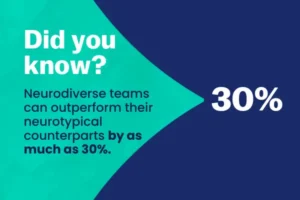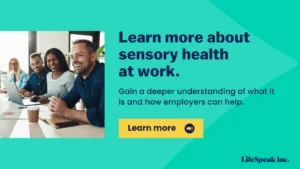Supporting Neurodiversity in the Workplace
Supporting Neurodiversity in the Workplace
In a world that increasingly demands innovation, adaptability, and out-of-the-box thinking, neurodiversity is emerging as a powerful force for change. Neurodivergent individuals, with their unique cognitive styles and perspectives, bring a fresh approach to creativity and collaboration. Neurodiversity has also been proven to be a particularly powerful asset in problem-solving, with studies indicating that neurodiverse teams can outperform their neurotypical counterparts by as much as 30%.
And when it comes to supporting neurodiversity in the workplace, organizations and leaders have the opportunity to create an inclusive environment that allows all employees to thrive, including neurodivergent employees.
But where to start? We’re turning to some of our leading experts to find out ways organizations can better support neurodivergent individuals in your workforce.
What is neurodiversity?
Neurodiversity refers to the natural variation in human brains and how they function. This can include differences in learning, attention, memory, communication, and social interaction. It is within this framework that we recognize neurodivergent individuals, who may have conditions such as autism, ADHD, dyslexia, or dyspraxia. It’s important to note that neurodivergence is by no means a disability, but rather a different way of thinking and processing information. In fact, experts recognize many strengths found within neurodivergent individuals.
Speaking to one subset of the neurodivergent population, LifeSpeak expert and clinical psychologist Dr. Ashley Junghans-Rutelonis, PhD, points out, “While it is true that there are difficulties associated with ADHD, there are also strengths to draw on. Research shows that individuals who have ADHD are great at creative and divergent thinking, meaning their approaches to projects and problem solving are typically unique, varied, and numerous.”
“It’s important to understand that sensory sensitivities are not a matter of preference, but a neurological difference that requires adjustments to the environment.”
Understanding the unique experience of neurodivergence
For someone with a neurotypical brain, the world can seem like a straightforward place. But for those with neurodivergent minds, it can be an adventure filled with both challenges and unique strengths. Sensory sensitivities, executive functioning difficulties, and social communication differences may seem like minor inconveniences, leading to questions about the necessity of accommodations or modifications.
While these differences might seem like minor inconveniences to some, they can have a significant impact on daily life for neurodivergent individuals. This is why it’s important to understand that sensory sensitivities are not a matter of preference, but a neurological difference that requires adjustments to the environment.
“Neurodivergent people make up approximately 15% of the population, so even if you don’t know it because we haven’t disclosed, we are already working at your company.”
The benefits of a diverse workforce
A neurodiverse workforce brings a wealth of benefits to organizations. Individuals with neurodivergent conditions often possess unique strengths and talents, including:
- Enhanced creativity and innovation
- Enhanced pattern recognition
- Specialized interests and expertise
- Hyperfocus
- Strong analytical and problem-solving skills
- Exceptional attention to detail
- Persistence and resilience
- A strong work ethic and dedication
Chances are you already have neurodivergent employees. As LifeSpeak expert and certified psychological workplace health and safety advisor Kelly Bron Johnson points out:
“Neurodivergent people make up approximately 15% of the population, so even if you don’t know it because we haven’t disclosed, we are already working at your company. The best way to attract us is to be open to the great diversity that is people, and then make sure your workplace is psychological safe and inclusive for them to feel welcome and accepted to stay.”
How to nurture and support a neurodiverse workforce
Fostering a welcoming and inclusive culture for neurodivergent employees is critical for attracting and retaining a talented workforce – one that reflects the diversity of the world around us.
But how can you be sure that your organization is building an inclusive culture?
Here are five ways to support neurodiversity in the workplace:
1. Make your hiring practices inclusive and offer accommodations:
Kelly Bron Johnson suggests asking these questions to get an idea of how inclusive your current processes are:
What barriers exist in your hiring processes?
Are you open to alternative interviewing techniques?
Do you accept resumes that don’t have the exact relevant educational background or that have gaps in work history?
Do you provide accommodations during your hiring process?
Do you communicate those policies on your website?
Once you have an idea of areas for growth in your hiring practices, consider starting with some foundational changes, such as:
- Conduct interviews in a distraction-free environment and provide clear instructions.
- Create a system that offers alternative ways for candidates to demonstrate their skills, such as written assignments or presentations in order to accommodate a wider range of candidates.
- Be flexible with scheduling and consider offering extended interview times, or in the case of longer interviews, be mindful of length and offer two shorter sessions instead of one.
2. Create supportive policies
To prioritize employee wellbeing and create an inclusive work environment, consider implementing the following policies:
- Offer flexible work arrangements, such as remote work options or compressed workweeks.
- Provide access to assistive technology, such as noise-canceling headphones or screen readers.
- Create quiet spaces for individuals to focus or take breaks.
- Be mindful of working breaks into heavy meeting days, normalize having screens off during meetings, and consider designating one day per week to be ‘meeting free’, allowing for a break from being ‘always on.’
- Provide guidance on effective communication strategies and how to adjust management styles to accommodate a range of needs.
- Encourage leaders to create a culture of inclusion and belonging.
3. Celebrate the diversity in your workforce
Embrace and appreciate the unique contributions of neurodivergent employees within your organization. Here are some strategies to foster a culture that values diversity and promotes inclusivity:
- Recognize and celebrate the unique contributions of neurodivergent employees.
- Create opportunities for employees to share their experiences and perspectives.
- Promote neurodiversity awareness through events and initiatives. Making on-demand resources available can be a low-pressure way to build greater understanding across all levels of an organization.
Some titles from the LifeSpeak Inc. library include:
- Neurodiversity: celebrating the unique strengths of the human brain
- ADHD in women & girls: symptoms and adaption strategies
- Understanding and managing ADHD
- ADHD in adults: symptoms and adaption strategies
- Using ADHD to your strength: moving beyond the challenges
- Mentoring and sponsoring people who are different from you
4. Reduce stigma around neurodiversity at work
Stigma and discrimination can be major barriers for neurodivergent individuals in the workplace. To combat this, it’s helpful to:
- Promote awareness and understanding: Educate employees about neurodiversity and the specific challenges faced by neurodivergent individuals.
- Encourage open communication: Create a safe space for employees to disclose their neurodivergence and discuss their needs.
- Challenge stereotypes: Whenever possible, address and dispel negative stereotypes associated with neurodivergence.
5. Train leaders and managers on how to be supportive of the neurodiverse workplace
It’s important to train leaders and managers on how to support neurodiversity even when there is no express acknowledgement. Oftentimes leaders have every desire to be supportive but lack actionable knowledge on appropriate solutions.
Offering resources that people can explore at their own pace, or with an easily searchable database to find support for specific issues they encounter, can go a long way to create continuity of learning around supporting neurodiversity in the workplace. These can be much more effective than one-time training or a single send of a digital resource that may not come to mind when a need arises.

Within the team environment, what are challenges faced by neurodivergent employees?
Neurodivergent individuals can experience unique challenges in the workplace due to the mismatch between their cognitive processing and the typical workplace environment.
Some of the most common challenges include:
- Sensory sensitivities: Many neurodivergent individuals have heightened sensitivity to sensory stimuli, such as noise, light, or strong smells. This can make it difficult to concentrate and be productive in a busy office environment.
- Social communication: Individuals with conditions like autism or ADHD may experience difficulty with social interaction and communication. They may find it challenging to understand social cues, engage in small talk, or participate in group discussions.
- Executive functioning: Executive functions, such as planning, organization, and time management, can be challenging for some neurodivergent individuals. This can lead to difficulties with meeting deadlines, managing workloads, and staying on top of tasks.
- Attention and focus: Individuals with ADHD or other attention-related conditions may struggle to maintain focus and attention for extended periods. They may be easily distracted or have difficulty completing tasks that require sustained concentration.
- Anxiety and stress: The challenges faced by neurodivergent individuals in the workplace can contribute to increased levels of anxiety and stress. This can further impact their ability to perform effectively and contribute to their overall wellbeing.
How can managers address these challenges effectively?
While everyone is different, some ways managers can support neurodivergent team members include:
- Provide sensory-friendly workspaces: Offer options for employees to adjust their workspace to reduce sensory overload, such as noise-canceling headphones, adjustable lighting, or designated quiet spaces. Learn more about sensory health and how organizations can improve it.
- Promote clear communication: Encourage clear and direct communication, avoiding sarcasm or ambiguous language. Provide written instructions whenever possible and allow employees to ask questions and clarify expectations.
- Support executive functioning: Offer tools and strategies to support executive functioning, such as task management apps, visual schedules, and regular check-ins with managers.
- Help enhance attention and focus: Provide opportunities for employees to take breaks and move around, offer flexible work arrangements, and break down large tasks into smaller, more manageable steps.
- Create a culture of support within the team: Foster a culture of understanding and acceptance, where employees feel comfortable disclosing their neurodivergence and seeking support when needed. Provide training for managers and colleagues to increase awareness and sensitivity to neurodiversity.
- Offer individualized accommodations: Recognize that everyone’s needs will vary, and provide individualized accommodations based on their specific challenges. This may include flexible work schedules, assistive technology, or modified job duties.
While it’s clear that leaders who are educated and aware of neurodiversity in the workplace have a chance to make the biggest impact from a DEI lens, specific, effective training resources are not always available. For managers looking to better understand and support their diverse teams, LifeSpeak Inc. offers over 80 resources related to neurodiversity. Experts include Kim S. Daniel, MEd, PhD, Mental Health Care Clinician, Dr. Ashley Junghans-Rutelonis, PhD, Clinical Psychologist, Kelly Bron Johnson, Certified Psychological Health and Safety Advisor, and more.
Some of our popular expert content on neurodiversity in the workplace speak directly to managers who want to better serve their teams, including:
- Hiring and talent management practices for an inclusive workplace
- Managers: recognizing and maximizing diverse talent,
- Promoting neurodiversity, disability, and mental health inclusion at work, and
- How to attract diverse candidates when hiring
LifeSpeak also has an entire content library dedicated to DEI, including neurodiversity and inclusion from an organizational lens. For more ideas on how to build on a culture of caring at work, check out the guide 20 Practical Strategies to Create a Culture of Wellbeing.
Supporting neurodiversity in the workplace is key to the DEI equation
In a society that was raised to value conformity, neurodiversity can serve as an asset, a diverse spectrum of unique minds and perspectives. While neurodivergent individuals may experience the world differently, their ways of thinking and processing information hold immense potential for innovation, creativity, and problem-solving. And by embracing and supporting neurodiversity, organizations can create a more equitable and productive workplace for all.
Looking to cultivate a culture of belonging?
LifeSpeak Inc.’s suite of solutions include expert resources for anyone wanting to better understand and support neurodivergence. LifeSpeak Inc.’s Mental Health and Resilience offers practical insights and tools to promote understanding, empathy, and cultural competence around neurodivergence in your workplace and beyond. Equip yourself with the knowledge and skills to create an inclusive environment where neurodiverse individuals can thrive. LifeSpeak’s Torchlight Parenting and Caregiving includes resources and expert guidance to equip you with the knowledge and skills to provide the best possible care for neurodivergent individuals. Discover practical strategies, valuable insights, and tailored support at every stage of the journey.

